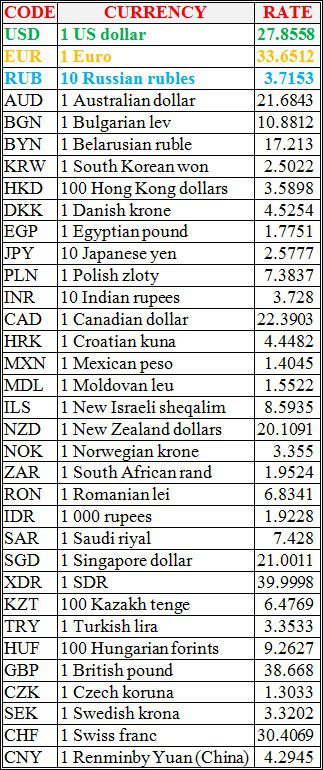
Minister of Agrarian Policy and Food of Ukraine Roman Leshchenko proposes to reduce the VAT rate from 20% to 14% on all types of agricultural products in order to reduce the cost of socially significant food products, while the ban on exports of sunflower seeds is, in his opinion, an illegal measure.
“Responsible state policy in this case is systemic measures to reduce prices for all socially significant food products that are included in the food basket of the Ukrainian consumer. All over the world and, above all, in the EU, this is achieved by the introduction of a reduced VAT rate for such products. Our proposal is to establish a 14% VAT rate on all types of agricultural products without any exceptions,” the minister wrote on his Facebook page on Friday, April 23.
Leshchenko noted that the “Soviet” practices of administrative regulation, like the draft resolution banning exports of sunflower seeds from May 15 to September 30, 2021, published for discussion on the website of the Economy Ministry, have a negative effect in a market economy.
“The ban on sunflower exports is an illegal measure, because, according to the current legislation, the basis for its introduction is a violation of the market equilibrium. However, there is no sunflower deficit in Ukraine!” he wrote.
Leshchenko said that the export ban also creates the preconditions for a monopoly conspiracy – concerted anti-competitive actions that the state must fight against. “An attempt to reduce the cost of a separate product at the expense of Ukrainian farmers is a dangerous measure that not only threatens the development of the agricultural industry and does not solve the problem comprehensively, but can also lead to the fact that the state will be forced to compensate farmers for losses caused by such unreasonable decisions,” Leshchenko said.

Consignors – which can only be Gazprom – have not been interested by offers of additional capacities for gas transportation through Ukraine for May from Gas Transmission System Operator of Ukraine (GTSOU).
Gazprom has a long-term reservation of Ukrainian capacities in the volume of 40 billion cubic meters for 2021, which is equal to 109 million cubic meters per day. The company additionally booked 15 million cubic meters (mcm) at an auction on April 19, giving a total of 124 mcm per day.
GTSOU offered an additional 63.7 mcm per day at the monthly auction on Tuesday; however, there were no bids for this.
Gazprom is pumping 124 mcm per day on average through Ukraine in April, fully using the volume booked.
If Gazprom had accepted the offer to use additional transit capacities, it would have meant a return to transportation volumes through Ukraine of 2019, before the new transit contract and payment of $3 billion to Naftogaz in line with a Stockholm arbitration ruling.
Europe is currently dramatically increasing gas consumption. Global supplies of liquefied natural gas and pipeline gas from Russia are at their highest levels, but for now, this does not make it possible to start mass pumping of gas into underground storage facilities to prepare for next winter.
In January 2021, Gazprom transported 124.51 mcm per day on average through Ukraine, in February – 104 mcm, and in March – 119.5 mcm.

Transit of oil through the territory of Ukraine by pipelines to European countries and Belarus in January-March 2021 decreased by 14.2% (by 488,300 tonnes) compared to the same period in 2020, to 2.959 million tonnes, according to the data of JSC Ukrtransnafta.
In particular, transit in the direction of Budkovce (Slovakia) amounted to 1.986 million tonnes (less by 13.4% compared to January-March 2020), Fenyeslitke (Hungary) – 702,300 tonnes (less by 21.3%), Mozyr (Belarus) – 270,600 tonnes (more by 3.5%).
The volume of oil transportation to refineries of Ukraine in the first quarter of this year amounted to 526,000 tonnes, which is 11.2% (66,100 tonnes) less than in January-March 2020. In particular, oil transportation along the Odesa-Kremenchuk route amounted to 197,900 tonnes (less by 13.9%).
Thus, in 2020, the total transportation of oil through the company’s pipelines amounted to 3.485 million tonnes (less by 13.7%). The share of transit volume in it is 84.9%, pumping to the country’s refineries – 15.1%.
In March 2021, oil transit through Ukraine by pipelines fell by 35.3% (by 492,800 tonnes) compared to the same month in 2020, to 903,000 tonnes.
Pumping to Ukrainian refineries last month decreased by 0.5% (by 900 tonnes), to 195,400 tonnes.
Ukrtransnafta said among the factors that influenced the total volume of oil transportation in the first quarter of 2021 were a decrease in oil demand among European consumers due to quarantine measures and the withdrawal of an oil refinery in Hungary for scheduled repairs.
National bank of Ukraine’s official rates as of 27/04/21

Source: National Bank of Ukraine

Some 68% of Ukrainian citizens believe that the direction of events in the country is wrong, according to the results of a sociological survey conducted by the Ukrainian Institute for the Future (UIF) with the assistance of New Image Marketing Group from April 9 to April 18 and presented at Interfax-Ukraine on Monday.
According to the survey, only 17% of respondents say that Ukraine moves in the right direction, and another 15% cannot decide.
One of the most pressing problems in Ukraine, 40% of those polled called the war in Donbas, 36% linked the problems with low wages and pensions, 31% with corruption, 29% with high utility rates, and 27% with a pandemic.
At the same time, it is noted that in March it was the problem of the war in Donbas that ranked first in the anti-rating.
Some 56% of citizens are sure that their rights and freedoms are not violated, and 44% noted that such violations are present.
In case of violation of their rights, citizens would choose mostly peaceful and non-violent methods to protect their rights and freedoms. First of all, this is the collection of signatures (26%), sanctioned rallies and actions (22%), and electronic petitions (16%). Road closures (15%) are the single most popular protest methods that go beyond the sanctioned limits. In general, radical actions gain no more than 5-6% and lag significantly behind moderate measures.
The number of citizens who are not ready to defend their rights has remained almost unchanged since March (41%).
The sociological survey was conducted by the “face-to-face” method using a structured interactive questionnaire. Audience included the population of Ukraine aged 18 and over in all regions, except for the temporarily occupied territories of Crimea and Donbas. The sample was 2,400 respondents.
The error of the representativeness of the survey with a confidence level of 0.95 does not exceed 2.05%.